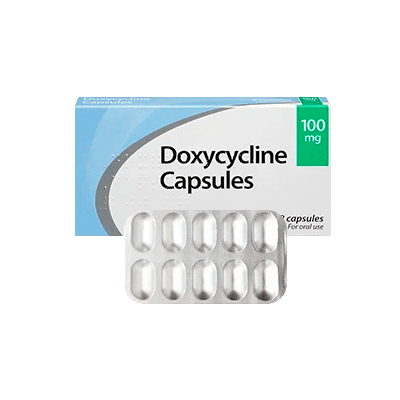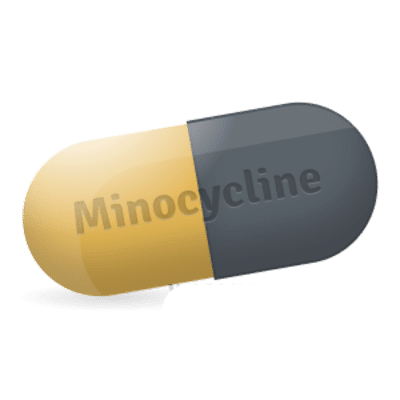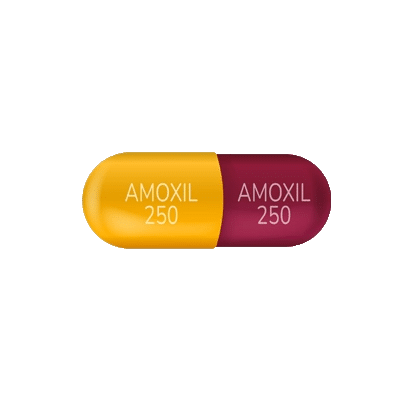I suffered from acne for a long time, tried a lot of products, but it was Doxycycline that helped. After a couple of weeks, my face became noticeably cleaner and my skin healthier. Of course, there were some minor side effects, but they completely disappeared after the end of the course.

Doxycycline
- Quality products
- Support 24/7
- Fast delivery
What is it?
Doxycycline is a broad-spectrum synthetic antibiotic derived from the tetracycline class. It is particularly valuable in the treatment of a variety of bacterial infections: urinary tract infections, acne, gonorrhea, chlamydia, periodontitis (gum disease), and acne-like spots, rashes, and lesions associated with rosacea. Its versatility makes it especially popular with physicians, as it can combat a variety of bacteria, helping patients return to their active lives in the shortest possible time.
Composition
The composition of Doxycycline includes the active ingredient - doxycycline, which belongs to the tetracycline class of antibiotics. It penetrates into bacterial cells, blocking protein synthesis, which leads to a stop in the growth and reproduction of bacteria.
- Doxycycline hydrochloride is the main active component that affects gram-positive and gram-negative microorganisms.
- Additional fillers, which may vary depending on the release form, but usually include microcrystalline cellulose, magnesium stearate, starch.
- In the case of liquid forms, flavors and stabilizers can be used.
The combination of these components makes Doxycycline an effective remedy for combating a wide range of infections, providing a reliable effect on bacteria.
How to use?
The instructions for use of Doxycycline state that this drug should be taken after meals, with plenty of water. This helps reduce irritation in the esophagus. The dosage depends on the type of infection and the severity of the condition, but there are some general recommendations for taking it.
- Take one or two doses per day. If two doses, the interval between them should be 12 hours.
- Do not exceed the recommended dose or increase the duration of treatment without consulting a doctor.
- Some forms of Doxycycline are not recommended for use with dairy products.
- Extended-release capsules should not be crushed, chewed or opened. They should be swallowed whole.
- If the drug is presented in liquid form, it must be shaken thoroughly before use, and dosed using a special measuring spoon.
These rules ensure maximum treatment effectiveness and minimize the risk of side effects.
How does it work?
The mechanism of action of Doxycycline is its ability to penetrate bacterial cells and disrupt protein biosynthesis. It prevents the formation of new protein structures necessary for the vital activity of bacteria, which stops their growth and reproduction. Thus, the patients body is able to cope with the infection on its own through natural defense reactions.
This antibiotic is active against a wide range of microorganisms, including both gram-positive and gram-negative bacteria. This makes it a universal choice for the treatment of infections, especially when the exact causative agent of the infection is unknown. Due to the effective penetration of Doxycycline into various tissues, it helps to quickly improve the patients condition and reduce the symptoms of the disease.
In addition, Doxycycline has prolonged activity, which allows it to be used in lower dosages compared to other antibiotics. This helps reduce the likelihood of resistance in pathogens, making it safer and more effective in the long term.
Indications
Doxycycline is indicated for the treatment of various infectious diseases caused by susceptible bacteria. The drug is used in the following diseases:
- Urinary tract infections, such as cystitis and pyelonephritis.
- Acne and other dermatological manifestations associated with bacterial infections of the skin.
- Sexually transmitted infections, including gonorrhea and chlamydia.
- Respiratory tract diseases, such as pneumonia and bronchitis.
- Periodontitis and other oral diseases caused by bacteria.
- Gastrointestinal tract infections, including salmonellosis and shigellosis.
These indications demonstrate the broad capabilities of Doxycycline in the fight against various infections, providing physicians with flexibility in choosing therapy.
Contraindications
Contraindications for the use of Doxycycline vary and include certain conditions and body characteristics. In the presence of the following factors, the use of the drug is not recommended:
- Hypersensitivity to doxycycline or other tetracyclines, which can cause allergic reactions.
- Pregnancy, especially in the second half of the term, due to the risk of negative effects on fetal development.
- Lactation period, since the drug can penetrate into breast milk.
- Children under 9 years old, due to the possibility of discoloration of teeth and delayed growth.
- Leukopenia, which can be aggravated by the action of the antibiotic.
- Porphyria and severe liver failure, in which the metabolism of the drug may be impaired.
These contraindications should be taken into account by the doctor before prescribing Doxycycline to avoid potential complications and adverse reactions.
Side effects
Like any medication, Doxycycline has side effects that may occur in some patients. It is important to monitor your condition closely and contact your doctor if you experience any serious symptoms. Common side effects include:
- Headaches and dizziness, which may affect concentration and coordination.
- Blurred vision, which requires caution when driving or operating machinery.
- Fever and chills, which may indicate the development of a secondary infection or allergic reaction.
- Body aches and skin rashes, including rashes and itching.
- Skin discoloration, yellowing, which may indicate liver problems.
- Pallepsy or hemorrhages, which may be a signal of a blood coagulation disorder.
If these symptoms occur, it is best to consult a doctor to adjust treatment or change the drug.
Frequently asked questions
Doxycycline Reviews and Experiences
I recently had a respiratory infection and the doctor prescribed Doxycycline. The drug was very effective, the cough and fever disappeared quite quickly. I was pleasantly surprised that the treatment went without significant side effects, I just had to be more responsible about eating and drinking more water.
I took Doxycycline for a urinary tract infection and the results were beyond my expectations. The symptoms went away fairly quickly and the side effects were minimal and minor. The need to wash down the medication with a lot of water is a bit of a bummer, but its a minor thing compared to its effectiveness.









